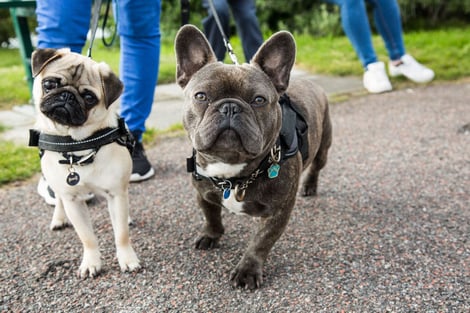It’s Never Too Early: How to Socialize Your Dog

Is your dog bold and adventurous? Or timid, aggressive, or fearful in new situations?
Especially after the pandemic‑related lockdowns, some pet parents worry if it’s safe to have friends or family visit without getting jumped on—or even bitten.
Pet parents who wait too long to introduce their puppies to new people, animals, sights, smells, and experiences may notice that it gets harder after a few months. Puppies grow up fast and can develop behaviors related to fear and separation anxiety.
The Importance of Socialization
The first question you may have is, “What is socialization for your dog?”
Simply put, it’s how you can prepare your puppy or dog to be comfortable and to interact safely with people and other animals.
Socialization is an important part of being a pet parent. Dogs are social animals that need to understand the rules and boundaries of interacting with others in different situations. It’s up to us to teach them what the world is about, and how to respond when they experience something (or someone) new and different. That is, appropriate socialization can lead to a well‑behaved dog.
Without proper socialization, puppies can develop behavioral issues that can challenge even the strongest bonds with pet parents. According to the position paper on puppy socialization from the American Veterinary Society of Animal Behavior, behavioral problems are one reason why people relinquish dogs to shelters. Also, if the behavior problem continues or worsens over time, these puppies may never grow up to be good household pets and be humanely euthanized before 3 years of age.
Many pet parents enroll in puppy socialization classes where qualified trainers use positive reinforcement techniques to introduce puppies to a variety of experiences and teach them how to play safely with others.
When Does Socialization Start?
Puppies should be gently handled shortly after birth to get used to people touching them on any part of their bodies. Socialization for a puppy typically starts at 3 weeks of age. It’s a process. It takes time, repetition, and for everyone to interact with them as consistently as possible. The process requires effort; good behavior must be reinforced, and puppies should be allowed to say no if they don’t want to interact with people, other animals, or things.
Puppies that come from reputable breeders have usually started the initial phase of socialization. Pet shelters and foster groups may also play a role in socializing puppies in their care. These pups have a head start on socialization.
But some puppies didn’t have such a great start. If your pup was abandoned at a young age (less than 12 weeks of age, which is the same as being 3 months old) or came from a puppy mill or pet store, they might have limited experience. They may have been confined to a cage with little chance to play with humans or other animals. Pups from these backgrounds often need extra care and attention to make sure they adjust to their new home.
The good news is you can start socializing your puppy in your home from the day you bring them into your family.
It’s Never Too Early to Socialize
When puppies are about 3 to 5 weeks of age, they interact with their mom, littermates, and human caretakers. They should be wagging their tails, eating semi‑solid food, and starting to mouth things. Keep your hands and fingers out of their mouths—they are not toys, and they can lead to puppies thinking that biting is OK. Puppies should show an interest in interacting with others. That is, they move toward people, other animals, or objects rather than freeze in place or move away from them, which might indicate they are feeling fear.
The next important stage is when they are 6 to 12 weeks of age. They need to interact with more family members (people and other animals) and venture out into the yard, and maybe hear a vacuum or lawnmower. Like young children, puppies can go through a phase of “stranger danger” from about 7 to 8 weeks of age.
Hopefully, your puppy has been socialized appropriately by others before you bring your pup home.
Unless you’ve raised a puppy recently, you might forget how many new sights and sounds can freak them out. As soon as you bring your puppy home, you’ll want to slowly start introducing them to objects and noises around your home, such as vacuum cleaners, doorbells, and different surfaces (carpet, tile, wood, grass).
They should also learn how to approach other creatures: neighbors of different ages, sizes, clothing and hairstyles, facial hair, and skin tones; pets; people wearing hats, masks, or sunglasses; people in wheelchairs; bicyclists. If you have a summer puppy in the Midwest, you might want to show them what you look like in a puffy parka, scarf, hat, and gloves.
Take your puppy out and give them opportunities to experience passing cars, bikes, skateboards, sirens, and other sights and sounds. Some stores and restaurant patios allow dogs, and it is a great opportunity to meet friendly folks and teach your pup to sit quietly. Hopefully, other pets there are friendly too. If the situation seems scary for your puppy, be prepared to go home before you really want to go. Look at the clues your pup is giving you.
Take your pup on rides so they get used to being in the car early on. It helps them get used to the motion so they don’t get carsick. And you don’t want a trip to the vet to be the only time they set paws in the vehicle. Go on trips and take them for walks in different dog‑friendly areas. You want them to look forward to getting into the car. Always remember to bring your dog’s collar or harness and leash, as well as dog waste bags. It’s polite and welcomed by others who also want to enjoy those spaces. Avoid using retractable leashes, which can lead to unwanted consequences.
The Critical First 3 Months
Some pet parents might be worried about attending classes or introducing their pup to others before they are fully vaccinated. It’s a bit of a dilemma: The critical socialization window for puppies starts to close at about 12 to 13 weeks, but puppy vaccinations continue until 16 weeks.
Sometimes pet parents get conflicting advice on when it’s okay to attend puppy socialization classes.
The position of the American Veterinary Society of Animal Behavior (AVSAB) is that puppies should be exposed to many different situations in the first 3 months of their lives and that they should attend classes before finishing all of their vaccinations.
The organization recommends puppies start classes as early as 7 to 8 weeks of age, as long as they have had a first dose of deworming and one set of vaccines 7 days before the first class.
As long as the training facility is kept clean and disinfected, the risks are small, and your healthy puppy will benefit from organized puppy socialization opportunities.
It’s definitely not too late to train your dog after 3 months, but if you are bringing an older dog into your house, you might want to seek guidance from your veterinarian or a reputable trainer.
What Happens in Puppy Socialization Class?
So much happens! Most puppy socialization classes allow for supervised play where puppies learn to read each other's signals. Pet parents are taught to give pups a break when things get too intense if a dog is showing signs of aggression, dominance, or fear.
Puppies start learning to come when called, and they get lots of treats when they listen and pay attention to their parents.
Trainers will introduce puppies to different surfaces, people, and scenarios. Sometimes they put on a veterinarian’s white coat to help them get used to having their paws, ears, and teeth touched like they would at a routine veterinary visit. It’s also helpful for you to get them used to these activities when you brush their teeth, keep their toenails short, or if you need to give your dog medications to treat problems in their ears (mites, yeast, and/or bacterial infections).
Dog Parks and Socialization
It’s tempting to want to bring your new puppy to the local off‑leash dog park. But you should resist the temptation until the puppy is done with its last dose of vaccines—especially the parvovirus vaccine. Puppies are exposed to this horrible disease directly (sniffing, licking, or eating poop or vomit) or indirectly (food or water bowls, collars, and leashes, or even humans who handle infected dogs). That’s why it’s important to keep puppies out of dog parks until they finish their puppy vaccinations.
After that, proceed with caution—and enjoy the frolic.
Fun with Dogs
Socialization is important for your dog’s mental health, and yours too. Pet parents who are worried about their dog’s behavior are stressed, and dogs are good at reading those signals.
The best thing about all of this is that socialization is fun for pet parents and their canine family members.
Let the adventures begin!

